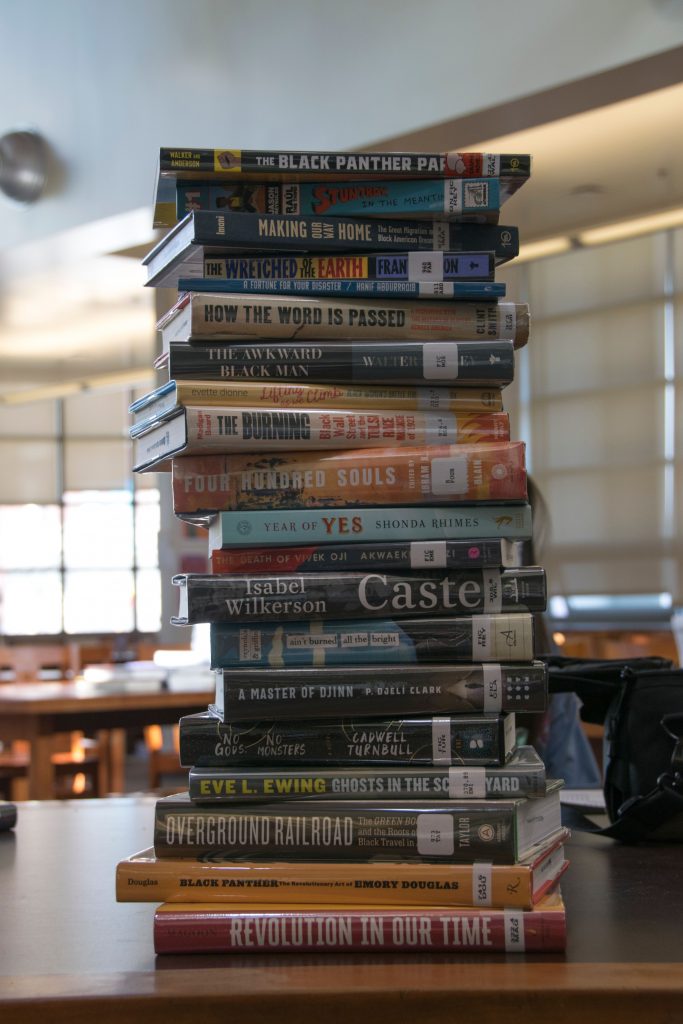The start of February marked the beginning of Black History Month, a time dedicated to celebrating the contributions African Americans have made throughout history. One way of honoring this month is by learning about books written by Black authors, some of which are highlighted by Berkeley High School’s (BHS) students and teachers.
Native Son by Richard Wright is important to Joseph Omwamba, a Universal 9th Grade English teacher. Published in 1940, the book tells the story of Bigger Thomas, a young man living in a poor area of Chicago. “Bigger Thomas starts out with everything against him but he ends up falling in love with reading, which made me identify with him,” Omwamba said. “The message of this book is that your current situation should not define you. Humans have this uncanny way of surviving even in some of the most dire conditions, just like how we are living today in the age of Covid-19.” He added that “Richard Wright shows that there is a light at the end of the tunnel.” Native Son is for anyone who enjoys plot twists and wants to be constantly wondering, “What happens next?”
The Fire Next Time by James Baldwin is a novel that means a lot to Hanim Nuru, a 12th grader in Berkeley International High School (BIHS). This non-fiction book was published in 1963 and is composed of two essays titled “My Dungeon Shook: Letter to my Nephew on the One Hundredth Anniversary of the Emancipation” and “Down at the Cross: Letter from a Region of my Mind.” Nuru said, “This book came from the perspective of a Black male in America, and I really enjoyed reading from that perspective because that’s not really highlighted in literature a lot.” The Fire Next Time starts with a letter written by James Baldwin to his nephew, and it’s followed by an essay about a difficult period of Baldwin’s life. The book especially deals with issues surrounding race and religion. “It talked a lot about internalized racism and how it can affect someone mentally,” Nuru explained. “It’s a novel that addresses the Black experience in America.”
Rhonda Jefferson is the faculty sponsor of the BHS Black Honor Society, and she said that her favorite author is Toni Morrison because she “[loves] everything she’s ever written.” Though Jefferson loves all of Morrison’s books, Beloved is one that particularly stands out to her. It is a fictional novel published in 1987 that depicts the story of Sethe, a former slave, who is haunted by a spirit in the year 1873. “I love Toni Morrison’s writing because it’s challenging,” Jefferson explained. “Her stories don’t seem to make sense until sometimes the last sentence of the book, and that last sentence always brings the whole story line together.” She also added that “Beloved shows the mindset of a slave, it lets you see what slavery does to the mind. How it attacks the mind. How it makes you do things you wouldn’t ordinarily do.” Beloved is a powerful novel that is perfect for anyone who wants an interesting read that keeps them on the edge of their seat.
Israel Nikodimos, a freshman at BHS, loves Just Mercy by Brian Stevenson. The memoir was published in 2014 and narrates the story of Stevenson’s career as a lawyer defending people in need. “It’s the story of this lawyer who helps this guy who was wrongly accused of killing someone,” Nikodimos said. “This is the first book that actually made me cry because of how sad it was to see how messed up the justice system is. It was very eye opening and it’s a lot to take in.” Just Mercy is an emotional true story that highlights the many problems in the criminal justice system as well as the perseverance and empathy it takes to fix it. “In the book, most of the lawyers wouldn’t help clients unless they were white or they had money or some sort of supremacy. It’s a good book to read if you want to be more aware of how the justice system works and how unfair it can be.”


